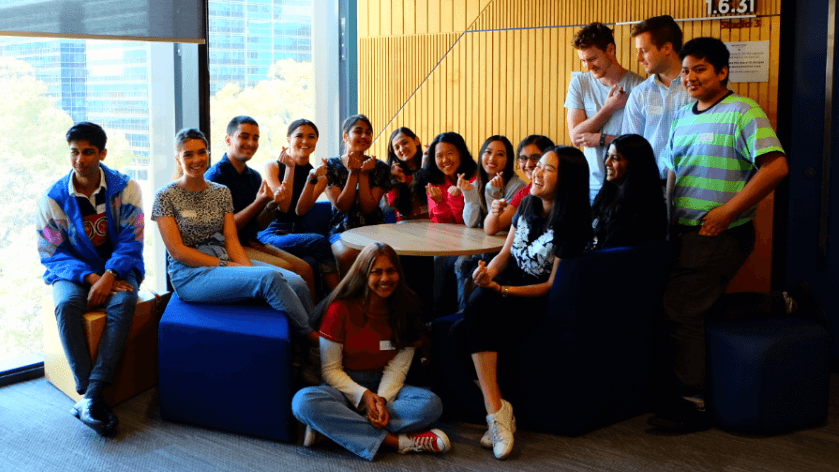WH&Y Commission
WH&Y authors: Professor Philippa Collin
- There are more young people living on the planet now than ever before, yet we rarely ask them about their health beliefs and practices, or about the kind of information, supports and services that could help them attain and maintain health as they grow from a child into an adult.
- We’ve created the WH&Y Commission to ensure that as we grow the field of adolescent health and translate research findings into policy and practice, young people are involved from the very start, setting research agendas and co-creating ethical and meaningful ways for teenagers to be involved in research and translation at national, state and territory, and local levels.
- We need a WH&Y Commission because our health system and services are failing teenagers. If we are ever going to understand why this is, and what we can do to turn this around, we must prioritise working in partnership with young people on research and translation.
- We have created the WH&Y Commission with young people, researchers and professionals to ensure it supports meaningful youth engagement and capacity-building towards making healthcare work better for young people.

WHY HAVE A WH&Y COMMISSION?
Young Australians are disenfranchised and under-served by existing healthcare systems which have evolved to focus on the healthcare needs of the very young and the ageing, injured and ill. This marginalisation is compounded by a research, training and policy environment that is designed to deal directly with adult decision-makers.
Health research, policy and service settings are ill-equipped to meet the complex ethical and communication challenges that relate to meaningful and beneficial engagement with young people in the Teenage Decade as members of the community and users of health services, digital and otherwise. Furthermore, there is a disconnect between youth (digital) cultures and current frameworks and channels for health research and translation. This results in gaps in knowledge, missed opportunities to leverage digital technologies for research and service delivery as well as the broader challenges of understanding and meeting young people’s expectations regarding their role in health research, service design and use.
Despite these challenges, many young people are actively concerned about health and the services they can access in the Teenage Decade.
The WH&Y Commission has been created to ensure:
-
adolescent health research agendas and projects can be systematically guided by young people;
-
peak and representative bodies can seek young people’s guidance and advice in their work on adolescent health;
-
young people’s advice and participation can be sought by policymakers across government in an ongoing way;
-
we do more than just engage young people in projects, instead growing coalitions of young people and strengthening youth-led networks for health;
-
we understand and tackle the emergent and the most pressing issues for youth participation in adolescent health research;
-
young people are supported and recognised as co-leaders and change-makers in health.
WHAT ARE WE LEARNING?
We developed the WH&Y Commission model over the course of 2018 by working with young people, researchers and professionals to understand how this initiative could best engage and support people in the process of making healthcare work better for teenagers. To do so, we explored young people’s own experiences and aspirations as well as case studies of best practice in youth participation in different health and youth-serving organisations.
Over the course of developing the WH&Y Commission, we also generated the WH&Y Engagement Framework which has identified values and questions to promote ethical engagement with young people in health research and translation, specifically:
-
embedding a shared, intergenerational responsibility across projects, systems and services
-
producing a common language and meaningful technologies across projects, systems and services by respecting the complexity of young people’s lives and needs.
-
co-designing projects, systems and services that genuinely relate to young people’s hopes, experiences and differences.
About The Authors
Professor
Philippa Collin is a Professor at the Institute for Culture and Society at Western Sydney University...
WHERE TO READ MORE
Our approach builds on decades of work by the youth sector to advocate for and develop principles and best-practice models and approaches for youth participation. Most Australian states and territories have a Commissioner or Advocate for Children and Young People and a Youth Peak Body that represents the interests of young people and the sector that supports them. These organisations have many practical guides and resources to support youth participation and engagement. Some of these can be accessed here:
-
Guidebook: Youth Engagement in Health Research, WH&Y with Young and Resilient Research Centre
-
Co-research toolkit, The Centre for Resilient and Inclusive Societies (CRIS)
-
Youth participation, Youth Affairs Council Victoria.
-
Participation resources, Office of the Advocate for Children and Young People
-
Not Just ‘Ticking a Box’: youth participation with young people from refugee and migrant backgrounds, Multicultural Youth Advocacy Network
-
Better Together: a practical guide to effective engagement with young people, Youth Affairs Council of South Australia
-
Youth Participation Kit: Organisations, Government of Western Australia
-
The Intergener8 Living Lab Tool Kit, Intergener8
-
Youth Participation Guide Index, Australian Youth Affairs Coalition









